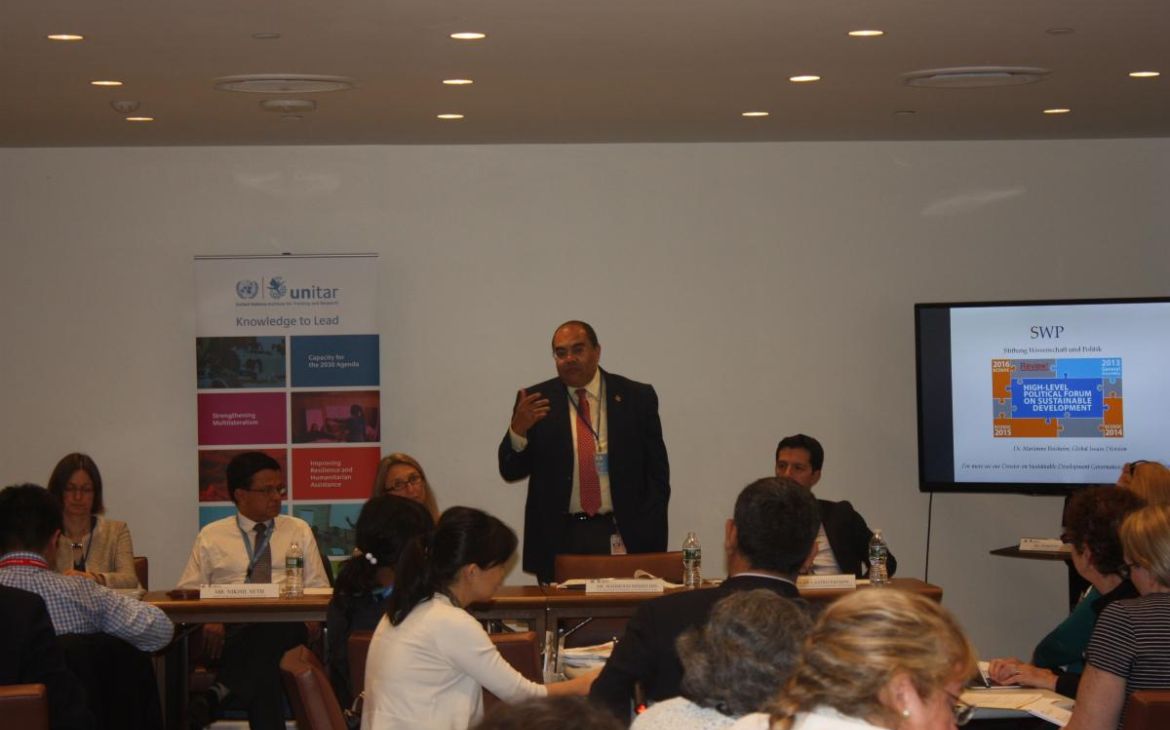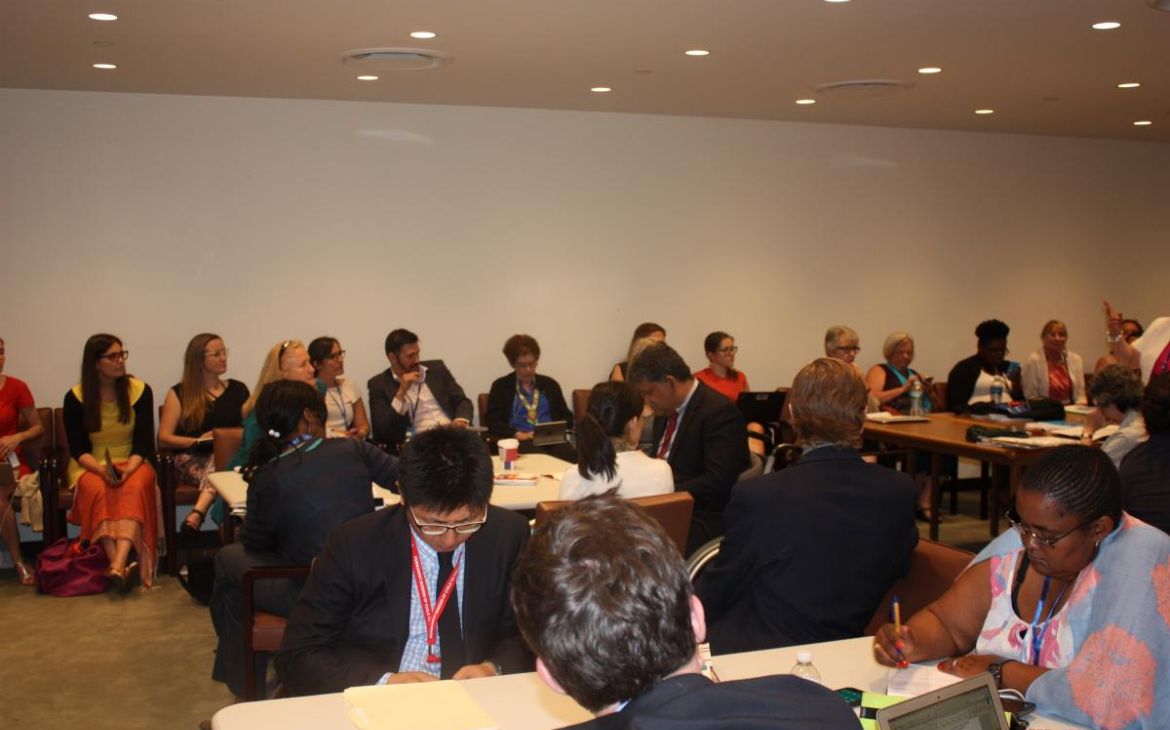15 July 2016, New York, USA – As the High-level Political Forum (HLPF) on Sustainable Development (HLPF) prepares for its first round of 22 national voluntary presentations (NVPs) on 19-20 July, UNITAR brought together a panel of eminent experts to discuss the ways in which these discrete, global-level Government-led presentations could be better linked to strong, regular and inclusive national and subnational review processes. The learning session entitled “National reviews and M&E systems for the SDGs” was the second event organized by UNITAR as part of the UNDESA-UNITAR SDGs Learning, Training and Practice Center providing for a valuable, well-attended knowledge-sharing space on the sidelines of the Forum. More than 100 participants benefitted from the opportunities provided by the two UNITAR’s learning sessions.
During a lively panel discussion, Marianne Beisheim, an international SDGs review expert from the German Institute of International and Security Affairs, Mahmoud Mohieldin from the World Bank, Francesca Perucci from UN Statistics Division, Felipe Castro Pinchon from the Colombian Ministry of National Planning, and Marco Segone from the UN Evaluation Group have shared their views and offered complementary perspectives. The panel discussion moderated by UNITAR’s Executive Director Nikhil Seth was followed by a practical training session led by Dorothy Lucks from EVALSDGs.
As a result of the session, participants could gain greater clarity on key requirements for effective national review systems for the SDGs and an improved understanding of the most challenging areas. The instrumental nature of the reviews has emerged as one common theme of this session, with all speakers stressing the need to integrate review findings into relevant policy-making processes. “The reviews are a means and not an end in themselves… we should work with the results,” noted Dr. Beisheim. National, regional and global reviews are expected to provide robust evidence, help identify both bottlenecks and good practices and inform policy-making processes through multiple learning loopholes. Mr. Seth stressed that the purpose of the session was precisely to draw attention to the importance of national and sub-national processes as a basis for the SDGs review system. Such processes should help to ensure follow-up on findings and recommendations by relevant national and local stakeholders.
The 2030 Agenda calls for providing timely and quality data and ensuring effective monitoring systems for the SDGs. Yet, data gaps are huge. “1.5 billion people have no ID documents, they are not in the records, they don’t count…,” said Dr. Mohieldin. “54% of births in Sub-Saharan Africa go unreported”, echoed this statement Ms. Perucci. She further noted that, without basic civil registries data, national statistical systems (NSSs) cannot report on many other indicators. The session highlighted the critical importance of strengthening the quality of data collection from traditional data sources such as censuses, household surveys and administrative records, as well as working with new data producers. Some of the urgently required, timely data could come from these new data sources as demonstrated by the World Bank project around a non-costly, technology-based way of tracking financial inclusion.
National Statistical Offices (NSOs) will have a key role to play in compiling national SDG indicators, and ensuring coordination and quality assurance for SDGs data. First, while countries use the 230 indicator framework adopted by the UN Statistical Commission in March 2016 as the main starting point, national solutions will vary depending on the relevance, priorities, data availability and existing capacities. Germany, for example, identified 60 SDG indicators which are however further complemented by thematic monitoring at the national level allowing to avoid duplication. Second, as noted by Ms. Perucci, “NSOs will have to see how they can integrate and validate data, including those coming from new data sources, to make sure data are reliable and can be trusted”.
As a result of the SDG negotiation process, there is an increased awareness around the critical importance of timely and quality data for good decision-making. The statistical area is emerging as one of the highest priorities at both international and national levels. The international community has recognized the need for an increased resource base, more and better training, and improved understanding of metadata for the SDGs. The UN High-level Group for Partnership, Coordination and Capacity Building for Statistics has been working in this direction to sustain the positive momentum and steer actions at global and national levels. Furthermore, UN Member States agreed to hold the first UN World Data Forum to be hosted by South Africa from 16 to 18 January 2016. Finally, the World Bank is preparing to re-launch its Global Monitoring Report in 2017.
The experience of Colombia underscores the scale of the monitoring challenge. One of the middle income countries with a strong statistical system, Colombia provides a good example of a well-running M&E system allowing to monitor and ensure progress on national targets through established accountability mechanisms, and evaluation-based decision making and performance management. “At least 86% of the global SDG targets have at least some action going on”, noted Mr. Felipe Castro Manchon. The early estimates of data availability for global SDG indicators produced by Colombia show that the country has data of different quality for around 54% of these 230 global indicators. To address data gaps and provide data for the so-called tier 3 indicators, the country has been looking to tap into opportunities presented by new data sources, including the private sector.
Finally, the role of evaluation was assessed as critical to measuring the causality between progress and government policies. The Chair of UN Evaluation Group Marco Segone shared several key messages in this respect. “Individual evaluations will not be enough, there is a need for a national evaluation system to inform the SDGs and reflect the interconnected nature of the global goals”, he said. In responding to one of the questions, Mr. Segone reiterated the necessity of bridging the gap between those who supply evidence and those who use it through an improved communication of data and analysis, on the one hand, and strengthened capacity for evaluation and data demand, literacy and use, on the other.
Some of the issues that have shaped the panel debate included: the challenge of ensuring data and evaluations are used by policy-makers to improve policies; the relevance and legitimacy of global rankings on SDG progress; the tracking of progress on targets requiring joint efforts and involving extraterritorial obligations (i.e., some Goal 10 targets); the possibility of involving third party mechanisms to strengthen trust in reporting in certain areas (i.e., Goal 16); and the potential role of CSOs in fostering monitoring, evaluations and accountability.
It was noted that one challenge is often that budgeting processes and policy-making processes are detached from each other. Furthermore, data produced are often not fully relevant for policy-makers. “Often policy-makers do not use data because this is not the data they need”, noted Ms. Perucci. Colombia has estimated that 34 out of 169 targets depend on international action, and some of them do not yet have global indicators. The ranking of the countries, while judged positive by some, has been assessed as difficult by others. “Some countries can find themselves at the bottom of the ladder right from the start”, was noted by one of the panelists. Finally, with regards to the role of the third party one opinion was that there is a need for national processes to ensure there are strong and well-recognized entities on human rights data. In addition, CSOs already play a significant role by providing citizen crowded data and could further ensure its channeling to national systems through national evaluation associations.
The session ended with a practical mini-training led by Dr. Lucks. The exercise has showcased the application of a system thinking approach to evaluating progress on the SDGs.
Links to PPTs:
Presentation by Marianne Beisheim “Regular and inclusive national reviews for the SDGs”
If you have any further questions, please contact elena.proden@unitar.org



